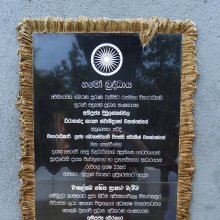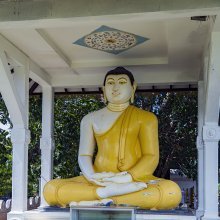Pradhana, Pradhāna: 30 definitions
Introduction:
Pradhana means something in Buddhism, Pali, Hinduism, Sanskrit, Jainism, Prakrit, the history of ancient India, Marathi, Hindi. If you want to know the exact meaning, history, etymology or English translation of this term then check out the descriptions on this page. Add your comment or reference to a book if you want to contribute to this summary article.
Alternative spellings of this word include Pradhan.
Images (photo gallery)
(+6 more images available)
In Hinduism
Purana and Itihasa (epic history)
Source: archive.org: Puranic EncyclopediaPradhāna (प्रधान).—An ancient Rajarṣi. A learned woman named Sulabhā was born in his family and king Janaka conducted scholarly discussions with her. (Śloka 184, Chapter 320, Śānti Parva).
Source: archive.org: Shiva Purana - English Translation1) Pradhāna (प्रधान) is another name for Śakti (prime cause, created from the body of Īśvara), according to Śivapurāṇa 2.1.6, while explaining the time of great dissolution (mahāpralaya):—“[...] this Śakti is called by various names. Pradhāna, Prakṛti, Māyā, Guṇavatī, Parā. The mother of Buddhi Tattva (The cosmic Intelligence), Vikṛtivarjitā (without modification). That Śakti is Ambikā, Prakṛti and the goddess of all. She is the prime cause and the mother of the three deities. [...]”.
2) Pradhāna (प्रधान) refers to the “chief of the deities”, according to the Śivapurāṇa 2.4.12 (“The story of Śiva and Pārvatī”).—Accordingly, as the Gods eulogized Śiva: “[...] Obeisance to the lord free from attachment; obeisance to Śiva the great soul. Obeisance to the pure beyond the world of matter, obeisance to the great, the unwasting. Obeisance to you the god of death holding the staff of punishment and noose in the hand. Obeisance to the chief of the deities (pradhāna) invoked by Vedic mantras. Obeisance to you the hundred-tongued deity. [...]”.
Source: Cologne Digital Sanskrit Dictionaries: The Purana Index1a) Pradhāna (प्रधान).—An ananta and avyayātma; covers the mahat.*
- * Brahmāṇḍa-purāṇa II. 21. 28; III. 43. 4; IV. 4. 12 and 20.
1b) (Māyā, Vāyu-purāṇa) a term for Prakṛti; with vikāra results in mahat-tatva.*
- * Brahmāṇḍa-purāṇa I. 1. 88 and 93; 3. 9; 5. 103; Vāyu-purāṇa 103. 12, 21, 36. Matsya-purāṇa 3. 15, 17; 60. 3; Vāyu-purāṇa 4. 19; 23. 56; 24. 66. Viṣṇu-purāṇa I. 2. 15-16.
Pradhāna (प्रधान) covers the mahat just as a seed is covered by the skin, according to the 10th century Saurapurāṇa: one of the various Upapurāṇas depicting Śaivism.—[...] From the disturbed prakṛti and the puruṣa sprang up the seed of mahat, which is of the nature of both pradhāna and puruṣa. The mahat-tattva is then covered by the pradhāna and being so covered it differentiates itself as the sāttvika, rājasa and tāmasa-mahat. The pradhāna covers the mahat just as a seed is covered by the skin. Being so covered there spring from the three fold mahat the threefold ahaṃkāra called vaikārika, taijasa and bhūtādi or tāmasa.

The Purana (पुराण, purāṇas) refers to Sanskrit literature preserving ancient India’s vast cultural history, including historical legends, religious ceremonies, various arts and sciences. The eighteen mahapuranas total over 400,000 shlokas (metrical couplets) and date to at least several centuries BCE.
Vyakarana (Sanskrit grammar)
Source: Wikisource: A dictionary of Sanskrit grammar1) Pradhāna (प्रधान).—The principal thing as opposed to the subordinate one; something which has got an independent purpose of its own and is not meant for another; प्रधानमुपसर्जनमिति च संबन्धिशब्दावेतौ (pradhānamupasarjanamiti ca saṃbandhiśabdāvetau) M.Bh. on P. I.2.43 V.5; cf. also प्रधानाप्रधानयोः प्रधाने कार्य-संप्रत्ययः (pradhānāpradhānayoḥ pradhāne kārya-saṃpratyayaḥ) Par. Sek. Pari. 97;
2) Pradhāna.—Predominant of main importance; cf. पूर्वपदार्थप्रधानोव्ययीभावः (pūrvapadārthapradhānovyayībhāvaḥ) etc. M. Bh. on II. 1.6, 20, 49 II.2.6 etc;
3) Pradhāna.—Primary as opposed to secondary; cf. गौणे कर्मणि दुह्यादेः प्रधाने नीहृकृष्वहाम् । (gauṇe karmaṇi duhyādeḥ pradhāne nīhṛkṛṣvahām |) cf. also प्रधानकर्मण्याख्येये लादीनाहुर्द्विकर्मणाम् । अप्रधाने दुहादीनाम् (pradhānakarmaṇyākhyeye lādīnāhurdvikarmaṇām | apradhāne duhādīnām) M.Bh.on I.4.51

Vyakarana (व्याकरण, vyākaraṇa) refers to Sanskrit grammar and represents one of the six additional sciences (vedanga) to be studied along with the Vedas. Vyakarana concerns itself with the rules of Sanskrit grammar and linguistic analysis in order to establish the correct context of words and sentences.
Dharmashastra (religious law)
Source: Sacred Texts: The Grihya Sutras, Part 2 (SBE30)Pradhāna (प्रधान) refers to a “principal act” or “primary sacrifice” and is accompanied by auxiliary acts (aṅga), as mentioned in the Āpastamba-yajña-paribhāṣā-sūtras.—“A principal act is what has its own name, and is prescribed with special reference to place, time, and performer”.

Dharmashastra (धर्मशास्त्र, dharmaśāstra) contains the instructions (shastra) regarding religious conduct of livelihood (dharma), ceremonies, jurisprudence (study of law) and more. It is categorized as smriti, an important and authoritative selection of books dealing with the Hindu lifestyle.
Kavya (poetry)
Source: archive.org: Naisadhacarita of SriharsaPradhāṇa (प्रधाण) refers to a “terrace in front of a building”, and is mentioned in the Naiṣadha-carita 19.11.—(“madhavaprāsādasya pradhāṇam”).

Kavya (काव्य, kavya) refers to Sanskrit poetry, a popular ancient Indian tradition of literature. There have been many Sanskrit poets over the ages, hailing from ancient India and beyond. This topic includes mahakavya, or ‘epic poetry’ and natya, or ‘dramatic poetry’.
Vaishnavism (Vaishava dharma)
Source: Pure Bhakti: Bhagavad-gita (4th edition)Pradhāna (प्रधान) refers to “(See māyā-śakti)”. (cf. Glossary page from Śrīmad-Bhagavad-Gītā).
Source: Pure Bhakti: Brhad BhagavatamrtamPradhāna (प्रधान) refers to:—The sum total manifestation of the three modes of material nature; the original, dormant state of material nature, prior to the creation, when the material elements are unmanifest. In this state the three modes of nature are in balance and thus inactive. (cf. Glossary page from Śrī Bṛhad-bhāgavatāmṛta).

Vaishnava (वैष्णव, vaiṣṇava) or vaishnavism (vaiṣṇavism) represents a tradition of Hinduism worshipping Vishnu as the supreme Lord. Similar to the Shaktism and Shaivism traditions, Vaishnavism also developed as an individual movement, famous for its exposition of the dashavatara (‘ten avatars of Vishnu’).
Shaktism (Shakta philosophy)
Source: Google Books: ManthanabhairavatantramPradhāna (प्रधान) refers to “fundamental reality”, according to the Ṣaṭsāhasrasaṃhitā, an expansion of the Kubjikāmatatantra: the earliest popular and most authoritative Tantra of the Kubjikā cult.—Accordingly, “She who is beyond the Cavity of Brahmā is said to be Kuṇḍalinī. That is the plane of the Doomsday Fire and there the Yogi dissolves away. One should know that that which is called the ‘Belly of Power’ (śaktyodara) is the container of the Doomsday Fire. The triple world is in the middle of it and it is said to be the (one) fundamental reality (pradhāna). [...]”.

Shakta (शाक्त, śākta) or Shaktism (śāktism) represents a tradition of Hinduism where the Goddess (Devi) is revered and worshipped. Shakta literature includes a range of scriptures, including various Agamas and Tantras, although its roots may be traced back to the Vedas.
Jyotisha (astronomy and astrology)
Source: Wisdom Library: Brihat Samhita by Varahamihira1) Pradhāna (प्रधान) is a due proportion of the three guṇas Sattva. Raja and Tamas, according to the Bṛhatsaṃhitā, an encyclopedic Sanskrit work written by Varāhamihira mainly focusing on the science of ancient Indian astronomy astronomy (Jyotiṣa).
2) Pradhāna (प्रधान) refers to “chief” or “principal”, according to the Bṛhatsaṃhitā (chapter 5).—Accordingly, “If the eclipse should, commencing at the edge, travel inwards and remain there for a time of the shape of a dark ball, it is technically known as Nirodha (blocking up): all creatures will be happy. If the eclipse should be a total one and continue so for a time, it is known as Avamardana (tormenting): the then chief provinces [i.e., pradhāna-deśa] will suffer and the then chief rulers will be afflicted with miseries”.

Jyotisha (ज्योतिष, jyotiṣa or jyotish) refers to ‘astronomy’ or “Vedic astrology” and represents the fifth of the six Vedangas (additional sciences to be studied along with the Vedas). Jyotisha concerns itself with the study and prediction of the movements of celestial bodies, in order to calculate the auspicious time for rituals and ceremonies.
Shaivism (Shaiva philosophy)
Source: Brill: Śaivism and the Tantric TraditionsPradhāna (प्रधान) refers to “primary”, according to the Īśvarapratyabhijñāvimarśinī III.2.12.—Accordingly, “This twofold state of one who is liberated while living is called samāveśa in the scriptures. For complete entering is itself primary (pradhāna) in each of these; other teachings are [only] for its attainment”.

Shaiva (शैव, śaiva) or Shaivism (śaivism) represents a tradition of Hinduism worshiping Shiva as the supreme being. Closely related to Shaktism, Shaiva literature includes a range of scriptures, including Tantras, while the root of this tradition may be traced back to the ancient Vedas.
Shilpashastra (iconography)
Source: Shodhganga: Elements of Art and Architecture in the Trtiyakhanda of the Visnudharmottarapurana (shilpa)Pradhāna (प्रधान) refers to a certain class of personalities which follows specific guidelines in the tradition of ancient Indian Painting (citra), according to the Viṣṇudharmottarapurāṇa, an ancient Sanskrit text which (being encyclopedic in nature) deals with a variety of cultural topics such as arts, architecture, music, grammar and astronomy.—In the Viṣṇudharmottarapurāṇa, the rules of Painting of different classes have been elaborately discussed. According to this work, Yakṣas should have the size of rucaka and the picture of Pradhāna and Mānava should be painted according to the size of śaśaka types of men. Thus the Viṣṇudharmottarapurāṇa establishes the fact that even in the pictures; the people belonging to different class and profession [e.g., Pradhāna] were projected with specific attire so that general people can equate the picture with the practical character.

Shilpashastra (शिल्पशास्त्र, śilpaśāstra) represents the ancient Indian science (shastra) of creative arts (shilpa) such as sculpture, iconography and painting. Closely related to Vastushastra (architecture), they often share the same literature.
In Buddhism
Tibetan Buddhism (Vajrayana or tantric Buddhism)
Source: Brill: Śaivism and the Tantric Traditions (tantric Buddhism)Pradhāna (प्रधान) refers to the “principal (seat)”, according to the Nāmamantrārthāvalokinī by Vilāsavajra, which is a commentary on the Nāmasaṃgīti.—Accordingly, [while describing Mahāvairocana]—“And then [the Sādhaka should visualise] Mahāvairocana on the principal seat (pradhāna-āsana), generated by means of the syllable āḥ. [Why has he four faces?] Since consciousness—which is of the nature of the Dharma-Sphere since, by its nature, it lacks such forms as the grasped [i.e., the subject-object duality]—is four-faced. [This is] because the four liberation faces [/doors]—emptiness and the rest—are the cause of the origination of all meditative concentrations, [and this in turn is] because their ground is the Dharma-Sphere. [...]”.

Tibetan Buddhism includes schools such as Nyingma, Kadampa, Kagyu and Gelug. Their primary canon of literature is divided in two broad categories: The Kangyur, which consists of Buddha’s words, and the Tengyur, which includes commentaries from various sources. Esotericism and tantra techniques (vajrayāna) are collected indepently.
In Jainism
General definition (in Jainism)
Source: The University of Sydney: A study of the Twelve ReflectionsPradhāna (प्रधान) refers to the “essential part (of the city)” (of the chief of the snakes), according to the 11th century Jñānārṇava, a treatise on Jain Yoga in roughly 2200 Sanskrit verses composed by Śubhacandra.—Accordingly, “The doctrine is able to produce the happiness which is the best part [com.—pradhāna—‘the essential part’] of the city of the chief of the snakes. The doctrine is the great joy conveyed to the world of mortals for those possessing a desire for that. The doctrine is the place of the arising of the taste for the constant happiness in the city of heaven. Does not the doctrine make a man fit for pleasure with a woman [in the form] of liberation?”.
Synonyms: Sāra.

Jainism is an Indian religion of Dharma whose doctrine revolves around harmlessness (ahimsa) towards every living being. The two major branches (Digambara and Svetambara) of Jainism stimulate self-control (or, shramana, ‘self-reliance’) and spiritual development through a path of peace for the soul to progess to the ultimate goal.
India history and geography
Source: Cologne Digital Sanskrit Dictionaries: Indian Epigraphical GlossaryPradhāna.—(SII 1; HD; BL), an official designation some- times indicating the chief minister or administrator also called Pradhāna-saciva (EI 23); cf. pañca-Pradhānāḥ (EI 5) ‘the five ministers’. See Ind. Ant., Vol. IX, p. 35 where Mantrin, Amātya and Pradhāna are separately mentioned. Note: pradhāna is defined in the “Indian epigraphical glossary” as it can be found on ancient inscriptions commonly written in Sanskrit, Prakrit or Dravidian languages.

The history of India traces the identification of countries, villages, towns and other regions of India, as well as mythology, zoology, royal dynasties, rulers, tribes, local festivities and traditions and regional languages. Ancient India enjoyed religious freedom and encourages the path of Dharma, a concept common to Buddhism, Hinduism, and Jainism.
Languages of India and abroad
Marathi-English dictionary
Source: DDSA: The Molesworth Marathi and English Dictionarypradhāna (प्रधान).—m (S) A minister; a counselor; the first attendant of a king. 2 n Nature; whether the natural state of a thing, or the cause of the material world.
--- OR ---
pradhāna (प्रधान).—a (S) Chief, main, principal. 2 Prevalent or' preponderant (in, among, amidst): also (in comp.) inhering or being in principally or prevalently. Ex. kāṃhīṃ vṛkṣa phalapradhāna asatāta kāṃhīṃ puṣpa- pradhāna kāṃhīṃ patrapradhāna; tyā haridāsācī kathā gāna- pradhāna āhē.
Source: DDSA: The Aryabhusan school dictionary, Marathi-Englishpradhāna (प्रधान).—m A minister. n Nature. a Chief. Prevalent.
Marathi is an Indo-European language having over 70 million native speakers people in (predominantly) Maharashtra India. Marathi, like many other Indo-Aryan languages, evolved from early forms of Prakrit, which itself is a subset of Sanskrit, one of the most ancient languages of the world.
Sanskrit dictionary
Source: DDSA: The practical Sanskrit-English dictionaryPradhana (प्रधन).—
1) A battle, fight, war, contest; प्रहितः प्रधनाय माधवानहमाकारयितुं महीभृता (prahitaḥ pradhanāya mādhavānahamākārayituṃ mahībhṛtā) Śiśupālavadha 16.52; क्षेत्रं क्षत्रप्रधनपिशुनं कौरवं तद्भजेथाः (kṣetraṃ kṣatrapradhanapiśunaṃ kauravaṃ tadbhajethāḥ) Meghadūta 5; R.11.77; Mv.6.33; Uttararāmacarita 5.1.
2) Spoil taken in battle.
3) Destruction.
4) Tearing, rending.
Derivable forms: pradhanam (प्रधनम्).
--- OR ---
Pradhāna (प्रधान).—a.
1) Chief, principal, pre-eminent, main, best, most excellent; as in; प्रधानामात्य, प्रधानपुरुष (pradhānāmātya, pradhānapuruṣa) &c.; रत्नैश्च पूजयेदेनं प्रधानपुरुषैः सह (ratnaiśca pūjayedenaṃ pradhānapuruṣaiḥ saha) Manusmṛti 7.23; प्रधानफलं वा आनुषङ्गिकं वा सर्वमेव आधातरि समवेतुमर्हति (pradhānaphalaṃ vā ānuṣaṅgikaṃ vā sarvameva ādhātari samavetumarhati) ŚB. on. MS.6.2.1; 'यस्मिन् कुले यः पुरुषः प्रधानः स सर्वयत्नेन हि रक्षणीयः (yasmin kule yaḥ puruṣaḥ pradhānaḥ sa sarvayatnena hi rakṣaṇīyaḥ)'.
2) Principally inherent, prevalent, predominant.
-nam 1 The chief thing or object, most important thing; head, chief; न परिचयो मलिनात्मनां प्रधानम् (na paricayo malinātmanāṃ pradhānam) Śiśupālavadha 7.61; G. L.18; प्रयोगप्रधानं हि नाट्यशास्त्रम् (prayogapradhānaṃ hi nāṭyaśāstram) M.1; शमप्रधानेषु तपो- धनेषु (śamapradhāneṣu tapo- dhaneṣu) Ś.2.7; गुणैश्च तैस्तैर्विनयप्रधानैः (guṇaiśca taistairvinayapradhānaiḥ) R.6.79.
2) The first evolver, originator, or source of the material world, the primary germ out of which all material appearances are evolved, according to Sāṅkhya philosophy; न पुनरपि प्रधानवादी अशब्दत्वं प्रधानस्या सिद्धमित्याह (na punarapi pradhānavādī aśabdatvaṃ pradhānasyā siddhamityāha) Ś. B.; see प्रकृति (prakṛti) also; प्रधानक्षेत्रज्ञपतिर्गुणेशः (pradhānakṣetrajñapatirguṇeśaḥ) Śvet. Up.6.16; एतस्याद्या प्रवृत्तिस्तु प्रधानात् संप्रवर्तते (etasyādyā pravṛttistu pradhānāt saṃpravartate) Mahābhārata (Bombay) 12.25.25.
3) The Supreme Spirit.
4) Intellect, understanding; एको मयेह भगवान् विबुधप्रधानैश्चित्तीकृतः प्रजननाय कथं नु यूयम् (eko mayeha bhagavān vibudhapradhānaiścittīkṛtaḥ prajananāya kathaṃ nu yūyam) Bhāgavata 4.1.28.
5) The principal member of a compound.
-naḥ, -nam 1 The principal attendant or companion of a king (his minister or confidant).
2) A noble, courtier.
3) An elephant-driver.
4) The commander-in-chief.
Source: Cologne Digital Sanskrit Dictionaries: Edgerton Buddhist Hybrid Sanskrit DictionaryPradhāna (प्रधान).—(nt.; also, oftener, prahāṇa 1, q.v.; see also prahita; = Pali padhāna; n. act. to pradadhāti), exertion: rūkṣa-pradhānaṃ prahitātmanaḥ Lalitavistara 255.3 (prose), of (me) having exerted myself in harsh exertions; rūkṣapradhānaprahitātmakatvāt Lalitavistara 256.6 (prose); the Mahāvastu parallels to these passages read lūha-prahāṇa-, see these words; samyakpradhānā caturo me aśvā Mahāvastu iii.120.14 (verse), my horses are the four right exertions, for which see also (samyak)prahāṇa; compare Pali sammappadhāna; the four (cited in Childers and [Pali Text Society’s Pali-English Dictionary]) are, exertion to prevent sinful states (dhamma = dharma) from arising, to get rid of those that exist, to produce good states, and to maintain those already existing; for [Buddhist Hybrid Sanskrit] definitions (agreeing with this) see prahāṇa. In Abhidharmakośa LaV-P. vi.281, Vyākhyā, four samyakpradhāna; the older Chin. rendering has effort, the later abandonment, as if (Sanskrit) prahāṇa; Tibetan also the latter.
Source: Cologne Digital Sanskrit Dictionaries: Shabda-Sagara Sanskrit-English DictionaryPradhana (प्रधन).—n.
(-naṃ) 1. War, battle. 2. Tearing, rending, destroying. 3. Spoil taken in battle. E. pra before, dhā to have, aff. kyu .
--- OR ---
Pradhāna (प्रधान).—n.
(-naṃ) 1. Nature, the natural state of anything, or the cause of the material world. 2. The Supreme God. 3. Intellect, understanding. 4. Chief, principal, (in this sense, it is always neuter and confined to the singular number.) mn.
(-naḥ-naṃ) 1. The first companion of a king, his minister, his eunuch or confident, &c. a courtier, a noble, 2. An elephant-driver. f.
(-nā) Prevalent, predominant. E. pra before, dhā to have, aff. lyuṭ .
Source: Cologne Digital Sanskrit Dictionaries: Benfey Sanskrit-English DictionaryPradhana (प्रधन).—[pra-dhana] (see nidhana), n. 1. Tearing, destroying, [Meghadūta, (ed. Gildemeister.)] 49; destruction, [Uttara Rāmacarita, 2. ed. Calc., 1862.] 119, 7. 2. War, battle.
--- OR ---
Pradhāna (प्रधान).—i. e. pra-dhā + ana, I. n. 1. Nature, Mahābhārata 13, 1009. 2. The Supreme God. 3. Intellect. 4. Chief, [Hitopadeśa] 49, 18; principal (only sing.), excellent, [Pañcatantra] 156, 15. 5. The first companion of a king, his minister, his confidant, etc. Ii. adj. Chief, principal, [Pañcatantra] i. [distich] 324; [Hitopadeśa] 60, 22; [Bhartṛhari, (ed. Bohlen.)] 2, 99.
Source: Cologne Digital Sanskrit Dictionaries: Cappeller Sanskrit-English DictionaryPradhana (प्रधन).—[neuter] the prize of the contest; contest, fight.
--- OR ---
Pradhāna (प्रधान).—[neuter] the main thing or person, chief, head; original matter or supreme spirit (ph.); often —° having — as chief thing or person i.e. devoted to, excelling or delighting in, full of. Adj. & °— chief, main, principal, best.
Source: Cologne Digital Sanskrit Dictionaries: Monier-Williams Sanskrit-English Dictionary1) Pradhana (प्रधन):—[=pra-dhana] n. (cf. dhana) spoil taken in battle, a prize gained by a victor, the battle or contest itself, [Ṛg-veda] etc. etc.
2) [v.s. ...] the best of one’s goods, valuables, [Nārada-smṛti, nāradīya-dharma-śāstra]
3) [v.s. ...] tearing, bursting etc. (= dāraṇa), [cf. Lexicographers, esp. such as amarasiṃha, halāyudha, hemacandra, etc.]
4) [v.s. ...] m. Name of a man
5) [v.s. ...] m. [plural] his descendants, [Brahma-purāṇa]
6) Pradhāna (प्रधान):—[from pra-dhā] n. a chief thing or person, the most important or essential part of anything, [Kātyāyana-śrauta-sūtra; Manu-smṛti; Mahābhārata] etc.
7) [v.s. ...] ([in the beginning of a compound]) the principal or first, chief, head of
8) [v.s. ...] ([often also ifc. (f(ā). ) e.g. indra-pradhāna, (a hymn) having Indra as the chief object or person addressed, [Nirukta, by Yāska]; prayoga-p, (the art of dancing) having practice as its essential part, chiefly practical, [Mālavikāgnimitra]])
9) [v.s. ...] ‘the Originator’, primary germ, original source of the visible or material universe (in Sāṃkhya = prakṛti q.v.), [Indian Wisdom, by Sir M. Monier-Williams 53, 1 etc.]
10) [v.s. ...] primary or unevolved matter or nature, [Sarvadarśana-saṃgraha]
11) [v.s. ...] supreme or universal soul, [cf. Lexicographers, esp. such as amarasiṃha, halāyudha, hemacandra, etc.]
12) [v.s. ...] intellect, understanding, [cf. Lexicographers, esp. such as amarasiṃha, halāyudha, hemacandra, etc.]
13) [v.s. ...] the first companion or attendant of a king, a courtier, a noble (also m.), [cf. Lexicographers, esp. such as amarasiṃha, halāyudha, hemacandra, etc.]
14) [v.s. ...] an elephant-driver (also m.), [cf. Lexicographers, esp. such as amarasiṃha, halāyudha, hemacandra, etc.]
15) [v.s. ...] (in gram.) the principal member of a compound (opp. to upasarjana q.v.)
16) [v.s. ...] mf(ā)n. chief, main, principal, most important
17) [v.s. ...] pre-eminent in ([instrumental case])
18) [v.s. ...] better than or superior to ([ablative]), [Mahābhārata; Kāvya literature] etc.
19) [v.s. ...] m. Name of an ancient king, [Mahābhārata]
20) Pradhānā (प्रधाना):—[from pradhāna > pra-dhā] f. Name of a Śakti, [Tantr.] (cf. [Indian Wisdom, by Sir M. Monier-Williams 522]).
Source: Cologne Digital Sanskrit Dictionaries: Yates Sanskrit-English Dictionary1) Pradhana (प्रधन):—[pra-dhana] (naṃ) 1. n. War, battle; destroying, tearing, rending.
2) Pradhāna (प्रधान):—[pra-dhāna] (naṃ) 1. n. Nature; God; intellect; being chief. m. King’s companion; elephant-driver.
Source: DDSA: Paia-sadda-mahannavo; a comprehensive Prakrit Hindi dictionary (S)Pradhāna (प्रधान) in the Sanskrit language is related to the Prakrit word: Pahāṇa.
[Sanskrit to German]
Sanskrit, also spelled संस्कृतम् (saṃskṛtam), is an ancient language of India commonly seen as the grandmother of the Indo-European language family (even English!). Closely allied with Prakrit and Pali, Sanskrit is more exhaustive in both grammar and terms and has the most extensive collection of literature in the world, greatly surpassing its sister-languages Greek and Latin.
Hindi dictionary
Source: DDSA: A practical Hindi-English dictionaryPradhāna (प्रधान) [Also spelled pradhan]:—(nm) the president, chairman; pradhan; (a) chief, head, principal, main; ~[tā/tva] presidentship; chairmanship dominance, supremacy; pre-eminence; —[kāryālaya] headquarter; —[maṃtrī] Prime Minister, Premier.
...
Kannada-English dictionary
Source: Alar: Kannada-English corpusPradhana (ಪ್ರಧನ):—
1) [noun] open armed conflict between countries or between factions within the same country; a war.
2) [noun] loot taken from the enemy; spoils of war; booty.
3) [noun] the act of tearing into pieces.
4) [noun] the act of looting, spoiling or destroying.
5) [noun] a rich, wealthy man.
6) [noun] (myth.) name of a hell.
--- OR ---
Pradhāna (ಪ್ರಧಾನ):—
1) [adjective] meaning a great deal; having much significance, consequence or value; important.
2) [adjective] first in rank, authority, importance, degree, etc.; principal.
3) [adjective] superior; pre-eminent.
--- OR ---
Pradhāna (ಪ್ರಧಾನ):—
1) [noun] that which or he who is important.
2) [noun] a principal rule or regulation.
3) [noun] (phil.) the primordial nature considered as the principal substance with which the universe is made of.
4) [noun] the Supreme Being.
5) [noun] the mind or intelligence.
6) [noun] the principal minister in the counsel of ministers assisting a king in his administration.
7) [noun] a kind of ornament.
8) [noun] a man of noble descent.
9) [noun] (gram.) the principal word in a composition.
Kannada is a Dravidian language (as opposed to the Indo-European language family) mainly spoken in the southwestern region of India.
See also (Relevant definitions)
Partial matches: Pra, Dhana, Tana.
Starts with (+40): Pradhana venkappayya, Pradhana-karma, Pradhana-karyalaya, Pradhana-madhyahnarekha, Pradhana-mandapa, Pradhana-parikshaka, Pradhana-senapati, Pradhana-upavakya, Pradhanabhaj, Pradhanabhava, Pradhanabhuta, Pradhanacarya, Pradhanachary, Pradhanacharya, Pradhanadhatu, Pradhanadhyaksha, Pradhanadhyakshata, Pradhanadhyapak, Pradhanadhyapaka, Pradhanaghataka.
Ends with (+30): Amdajapradhana, Anyapadarthapradhana, Apradhana, Arthapradhana, Ashtapradhana, Bhavapradhana, Dharmapradhana, Ghatanapradhana, Grama-pradhana, Hakkapradhana, Hastipradhana, Hegadi Pradhana, Idampradhana, Jagatpradhana, Karmapradhana, Krishipradhana, Mahapradhana, Mantripradhana, Manushapradhana, Mukhya-pradhana.
Full-text (+274): Pradhanamantrin, Dharmapradhana, Pradhanika, Pradhanamatya, Pradhanottama, Pradhanadhatu, Apradhana, Pradhanatas, Yathapradhanam, Pradhanaghataka, Pradhanangana, Pradhanavadin, Pradhanakaranavada, Sahasrapradhana, Pradhanatva, Yathapradhanatas, Pradhanata, Pradhanaka, Shamapradhana, Svapradhana.
Relevant text
Search found 125 books and stories containing Pradhana, Pradhāna, Pra-dhana, Pradhānā, Pra-dhāna; (plurals include: Pradhanas, Pradhānas, dhanas, Pradhānās, dhānas). You can also click to the full overview containing English textual excerpts. Below are direct links for the most relevant articles:
Garga Samhita (English) (by Danavir Goswami)
Verse 1.16.26 < [Chapter 16 - Description of Śrī Rādhikā’s Wedding]
Verse 8.13.13 < [Chapter 13 - A Thousand Names of Lord Balarāma]
Verse 5.20.24 < [Chapter 20 - The Liberation of Ṛbhu Muni During the Rāsa-dance Festival]
Apastamba Yajna-paribhasa-sutras (by Hermann Oldenberg)
Prasthanatrayi Swaminarayan Bhashyam (Study) (by Sadhu Gyanananddas)
3.8. Māyā and the Creation of the Universes < [Chapter 3 - Analysis on the Basis of Metaphysics]
3.8.1. The Real Creator and Cause < [Chapter 3 - Analysis on the Basis of Metaphysics]
3.2. Three Guṇas of Māyā < [Chapter 3 - Analysis on the Basis of Metaphysics]
Amarakoshodghatana of Kshirasvamin (study) (by A. Yamuna Devi)
Philosophy (1): Some concepts of Sāṅkhyā philosophy < [Chapter 4 - Cultural Aspects]
Sahitya-kaumudi by Baladeva Vidyabhushana (by Gaurapada Dāsa)
Text 6.1 < [Chapter 6 - Third-rate Poetry and Super-excellent Poetry]
Text 5.12 < [Chapter 5 - Second-rate Poetry]
Text 10.159 < [Chapter 10 - Ornaments of Meaning]
Brahma Sutras (Nimbarka commentary) (by Roma Bose)
Brahma-Sūtra 1.2.20 < [Adhikaraṇa 5 - Sūtras 19-21]
Brahma-Sūtra 2.2.9 < [Adhikaraṇa 1 - Sūtras 1-10]
Brahma-Sūtra 2.2.4 < [Adhikaraṇa 1 - Sūtras 1-10]
Related products








